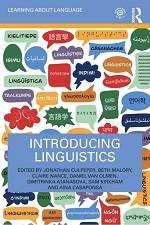Email: b.malory@ucl.ac.uk Office: FC 125 Internal Phone: 08205 External Phone: 020 7679 8205
|  |
Education and Experience
Beth joined UCL as Lecturer in English Linguistics in 2022. She completed her undergraduate and master’s degrees at the University of Oxford’s English Faculty, before moving to Lancaster University’s Department of Linguistics and English Language to complete her PhD.
Beth worked for several years as Associate Lecturer at Lancaster University. She has also held visiting lectureships and convened undergraduate courses at the University of Manchester’s Department of Linguistics and English Language, and Liverpool Hope’s English Department. She was Research Associate on the AHRC-ESRC SAMUELS Project, based at the University of Central Lancashire, and Research Assistant on the Spoken Learner Corpus Project, based at Lancaster University.
Prior to joining the English Department at UCL, Beth was involved in editing the Routledge textbook Introducing Linguistics, alongside a team of colleagues at Lancaster University.
Research Interests
Beth’s principal areas of research interest are sociolinguistics, including sociohistorical linguistics, discourse, and corpus methodologies. She is particularly interested in the impact of social agendas on language variation and change, and the means by which linguistic manifestations of such agendas can be traced and their effects ascertained. Her doctoral research developed two new methodological approaches for advancing understandings of prescriptivism; one which used protocols from Corpus-Assisted Discourse Studies to explore mechanisms of language norm dissemination, and another which applied the statistical technique Change Point Analysis to language change.
Beth is particularly interested in the relationship between different types of prescriptivism, for instance progressive/inclusive prescriptive agendas and those which are conservative/standardizing. Much of her current work considers what the mechanisms through which prescriptive norms have been disseminated in recent centuries can tell us about the implementation of ‘inclusive’ language guidelines. Beth is particularly interested in medical communication, and especially the language used in obstetric and gynaecological care. She is currently working on her first monograph, The Language of Gestational Bereavement: Past, Present, and Future, which considers these issues in relation to the language used around the deaths of babies during pregnancy. She is also active in the field of ecolinguistics, where her research explores the role of language in perpetuating ecologically damaging human behaviours.
Much of Beth’s research uses corpus linguistic methodologies. She is interested in synergising quantitative and qualitative methodologies, both in terms of researching discursive constructions using corpora and in exploring language variation and change using corpus approaches.
Beth is particularly interested in supervising PhDs on prescriptivism, medical communication, ecolinguistics, and Late Modern English usage, or those which develop or utilise English corpora or innovative corpus methodologies for linguistic research.
Selected Publications
 |
Forthcoming, 2022. Introducing Linguistics. With Jonathan Culpeper, Claire Nance, Daniel Van Olmen, Dimitrinka Atanasova, Sam Kirkham, and Aina Casaponsa. Routledge.
Forthcoming, 2023. ‘A lifetime in writing: grammatical change and continuity in Burney’s prose’. Manuscript in preparation (for submission to The Burney Journal.
Forthcoming, 2022. ‘Pinpointing prescriptive impact: Using change point analysis for the study of prescriptivism at the idiolectal level’. International Journal of Corpus Linguistics.
Forthcoming, 2022. ‘Historical linguistics’. In J. Culpeper et al. (eds.) Introducing Linguistics. Routledge.
Forthcoming, 2022. ‘Studying Discourse’. In J. Culpeper et al. (eds.) Introducing Linguistics. Routledge.
Forthcoming, 2022. With Karin Tusting. ‘Sociolinguistics’. In J. Culpeper et al. (eds.) Introducing Linguistics. Routledge.
2022. ‘The transition from abortion to miscarriage to describe early pregnancy loss in British medical journals: a prescribed or natural lexical change?’. Medical Humanities.
2022. ‘Commercial prescriptivism: exploring the legislative enforcement of minor linguistic variants and its ramifications for consumers and the retail sector’. International Journal of Language and Law.
2017. With Dawn Archer. ‘Tracing facework over time using semi-automated methods’. International Journal of Corpus Linguistics, Volume 22, Number 1, pp.27-56.
 Close
Close

